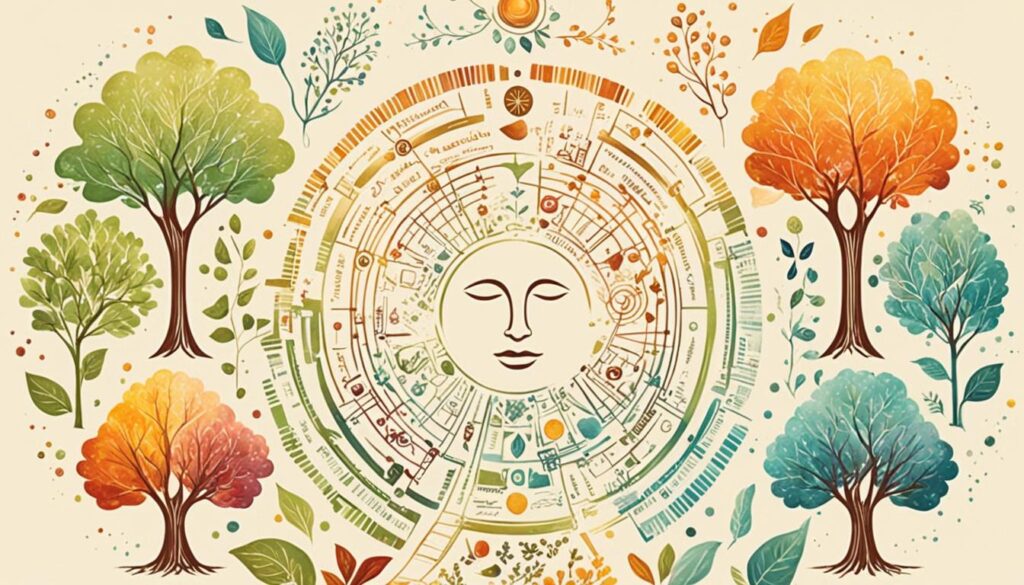“You yourself, as much as anybody in the entire universe, deserve your love and affection.” – Buddha
Inner peace is a state that many of us long for. It is the harmony and serenity that comes from making peace with ourselves. But in a world filled with distractions, self-doubt, and external pressures, finding that inner harmony can feel like an elusive goal.
So, how do you make peace with yourself? How do you find that sense of self-acceptance, inner peace, and personal growth? In this article, we will explore the profound wisdom of Buddhism and its teachings that can guide us on this transformative journey.
Key Takeaways:
- Cultivating self-acceptance is essential in finding inner peace and harmony.
- Finding purpose and embracing mindfulness can lead to personal growth and emotional healing.
- Self-compassion and self-care are integral aspects of nurturing and loving oneself.
- Listening to your inner voice and understanding your desires and needs can guide you towards authenticity and fulfillment.
- Continuous personal development and self-improvement are vital for evolving and finding inner harmony.
Understanding Inner Peace
Inner peace is a profound state of tranquility that allows you to find harmony within yourself and the world around you. To fully comprehend the concept of inner peace, we turn to the work of Dale R. Floody and his renowned Viterbo Serenity Inventory.
Defining Inner Peace
Dale R. Floody’s Viterbo Serenity Inventory defines inner peace as the integration of four key components: higher power, harmony, positivity, and lifestyle.
- Higher Power: This aspect involves acknowledging and cultivating a spiritual connection, finding meaning beyond oneself, and embracing a sense of purpose.
- Harmony: Achieving harmony requires practicing acceptance, mindfulness, and forgiveness. It means finding balance within yourself and fostering harmonious relationships with others.
- Positivity: Positivity involves cultivating happiness, joy, and subjective well-being. It focuses on nurturing a positive mindset, embracing gratitude, and seeking optimism in all aspects of life.
- Lifestyle: Lifestyle choices play a crucial role in nurturing inner peace. Living in the present moment, embracing simplicity, and prioritizing self-care are vital for creating a lifestyle that supports serenity.
| Components | Description | |
|---|---|---|
| Higher Power | Involves spirituality, connectedness, and a sense of meaning. | |
| Harmony | Practices acceptance, mindfulness, and forgiveness. | |
| Positivity | Fosters happiness and subjective well-being. | |
| Lifestyle | Includes living in the present, pursuing simplicity, and prioritizing self-care. |
This comprehensive framework allows individuals to explore and cultivate inner peace by focusing on these fundamental components. By developing a strong connection to higher power, nurturing harmony, embracing positivity, and adopting a mindful lifestyle, one can embark on a transformative journey towards inner peace and serenity.

The Relationship Between Inner Peace and Happiness
Inner peace and happiness are closely intertwined, creating a profound impact on your subjective well-being. While the exact causal relationship between these two concepts is not yet fully understood, research suggests that inner peace contributes significantly to lasting happiness.
Inner peace encompasses a state of serenity, contentment, and harmony within yourself. It involves finding balance, acceptance, and mindfulness in your daily life. When you cultivate inner peace, you pave the way for happiness to flourish.
Happiness, on the other hand, is a subjective experience of joy, fulfillment, and satisfaction. It encompasses positive emotions, life satisfaction, and a sense of purpose. Inner peace acts as a foundation for happiness, providing a sense of stability and well-being that enhances overall life satisfaction.
Studies have shown that individuals who have a strong sense of inner peace tend to experience higher levels of happiness and subjective well-being. The elements of inner peace, such as acceptance, gratitude, and self-compassion, contribute to a more positive outlook on life and a greater ability to navigate challenges with resilience.
“The key to happiness is inner peace. The greatest obstacles to inner peace are disturbing emotions such as anger, attachment, fear, and suspicion, while love and compassion and genuine concern for others automatically eliminate these obstacles.” – Dalai Lama

The Components of Inner Peace
Inner peace is not a single entity but encompasses various facets that work together to create a harmonious state of being. These components include:
- Spirituality and Higher Power: Connecting with a higher power or embracing spirituality can provide a sense of purpose, meaning, and connectedness.
- Acceptance and Mindfulness: Accepting the present moment, embracing imperfections, and practicing mindfulness can help cultivate inner peace.
- Forgiveness and Self-Compassion: Letting go of grudges, forgiving yourself and others, and showing self-compassion contribute to a more peaceful mindset.
- Positivity and Happiness: Cultivating positive emotions, nurturing happiness, and focusing on subjective well-being are essential aspects of inner peace.
- Lifestyle Choices: Making positive changes in your lifestyle, such as adopting healthy habits, simplifying your life, and prioritizing self-care, can support inner peace.
By nurturing these components, you can foster a deep sense of inner peace that positively influences your overall happiness and well-being.
The Importance of Pursuing Inner Peace
Seeking inner peace is not merely a means to an end; it is a journey of self-discovery and personal growth. When you prioritize inner peace, you create a solid foundation for a more fulfilling and joyful life. Here are some benefits of cultivating inner peace:
| Benefits of Inner Peace |
|---|
| Reduced stress and anxiety levels |
| Improved emotional well-being |
| Enhanced ability to cope with challenges |
| Increased self-awareness and self-acceptance |
| Improved relationships with others |
| Greater clarity and focus |
| Heightened creativity and intuition |
| Enhanced overall life satisfaction |
Finding inner peace is a personal and ongoing process. It requires self-reflection, mindfulness, and a commitment to nurturing your well-being. By embracing inner peace, you create a positive ripple effect that extends to all areas of your life, leading to a happier and more fulfilling existence.
Practical Ways to Find Inner Peace
When it comes to finding inner peace, there are practical tips that can help you on your journey towards serenity. Incorporating these practices into your daily life can have a profound impact on your overall well-being. Here are some actionable steps you can take:
Finding Your Purpose
Having a sense of purpose can provide direction and meaning in your life. Take some time to reflect on what truly matters to you and what passions you want to pursue. Aligning your actions with your purpose can bring a sense of fulfillment and peace.
Practicing Mindfulness
Mindfulness involves being fully present in the moment and cultivating awareness without judgment. Engaging in mindfulness exercises such as meditation, deep breathing, or mindful walking can help you calm your mind and find tranquility amidst the chaos of life.
Acceptance and Letting Go
Accepting that you can’t control everything and learning to let go of what is beyond your control can bring a sense of peace. Embrace the concept of surrender and focus on the things you can change rather than dwelling on those you can’t.
Self-Care
Take care of yourself by prioritizing self-care practices. Engage in activities that nourish your mind, body, and soul. This can include exercise, getting enough sleep, practicing relaxation techniques, or engaging in hobbies that bring you joy.
Finding Humor in Life
Laughter is truly the best medicine. Cultivate a sense of humor and find opportunities for levity in your daily life. Surround yourself with people who bring laughter and positivity, and don’t be afraid to laugh at yourself. Laughter can instantly lift your spirits and bring a sense of lightness.
Connecting with Nature
Spend time in nature and appreciate the beauty that surrounds you. Whether it’s going for a walk in the park, hiking in the mountains, or simply sitting in your backyard, connecting with nature can help you find inner peace and restore your sense of tranquility.
Cultivating a Daily Gratitude Practice
Take time each day to reflect on the things you are grateful for. This can be done through journaling, making a gratitude list, or simply pausing to appreciate the small joys in life. Practicing gratitude can shift your focus to the positive aspects of life and promote a sense of contentment.
By incorporating these practical tips into your daily life, you can find inner peace and cultivate a sense of serenity. Remember, finding inner peace is a journey, so be patient with yourself and embrace the process.
The Importance of Self-Love in Finding Inner Harmony
Self-love is the key to finding inner harmony and creating a strong foundation for personal growth. It goes beyond mere vanity or self-indulgence. Self-love is about respecting yourself, accepting both your strengths and perceived shortcomings, and making choices that nurture your well-being.
When you practice self-love, you develop a deep sense of personal uniqueness. You recognize that you are a one-of-a-kind individual with your own set of qualities, talents, and experiences. Embracing your personal uniqueness allows you to appreciate yourself for who you are, free from comparison or self-doubt.
Self-love also brings a profound awareness of your self-worth. You understand that you are inherently deserving of love, happiness, and fulfillment. This awareness helps you establish healthy boundaries in relationships, as you recognize that you deserve to be treated with kindness and respect.
By cultivating self-love, you lay the groundwork for inner harmony. Inner harmony is a state of being where you feel a deep sense of peace and alignment within yourself. It is not about being perfect or flawle
Listening to Yourself: Understanding Desires and Needs
When finding inner peace, it is essential to listen to yourself and gain a deep understanding of your desires and needs. By tuning into your inner voice, you can uncover your true passions and align your actions with your authentic self. This practice of self-awareness allows you to live a life that is true to who you are and fosters a sense of fulfillment.
Listening to yourself begins with recognizing and acknowledging your desires. What is it that truly lights you up and brings you joy? Take the time to reflect on your interests, hobbies, and the activities that make you feel alive. These desires are the keys to unlocking your authentic self and living a life in alignment with your truest passions.

To better understand your needs, pay attention to the signals of your body and mind. Are you feeling drained and exhausted? This might be a sign that you need more rest and self-care. Are you craving connection and meaningful relationships? This could indicate the need for deeper social connections. By listening to these cues, you can identify and address areas of your life that require attention, nurturing, and growth.
To delve even deeper into self-awareness, ask yourself leading questions. What are your aspirations and goals? What values do you hold dear? Are your current choices and actions aligned with these values? Through introspection and honest self-evaluation, you can gain clarity on what truly matters to you and make decisions that resonate with your authentic self.
Finding Authenticity Through Self-Discovery
Listening to yourself and understanding your desires and needs is a journey of self-discovery. By embarking on this path, you can uncover your unique authenticity and live a life that is true to who you are. Embrace the process of self-awareness, for it is through this journey that you will find inner peace, fulfillment, and a sense of purpose.
Understanding Your Desires and Needs
| Desires | Needs |
|---|---|
| Identify your passions and interests | Recognize the signals from your body and mind |
| Align your actions with your authentic self | Address areas of your life that require attention |
| Reflect on your aspirations and goals | Understand and nurture your physical and emotional well-being |
| Evaluate if your choices align with your values | Ask leading questions to gain self-awareness |
Evolving and Personal Development
Evolving and personal development are essential aspects of finding inner harmony and achieving personal growth. By actively engaging in personal development practices, you have the opportunity to enhance your life, cultivate integrity, make progress, and experience fulfillment.
To embark on this journey of self-improvement and growth, it is crucial to set goals that align with your values and aspirations. These goals provide a sense of direction and purpose, motivating you to consistently strive for personal excellence.
Self-improvement involves the continuous pursuit of knowledge, skills, and self-awareness. By embracing a mindset of lifelong learning, you open yourself up to new experiences and opportunities for growth. This can include attending workshops, enrolling in courses, reading personal development books, or seeking guidance from mentors and experts in your field of interest.
An important aspect of personal development is maintaining integrity. Honoring your values and ethics ensures that your actions align with your principles, fostering a sense of authenticity and inner fulfillment. It also cultivates trust and respect in your relationships, both personal and professional.
If personal development is the vehicle, progress is the fuel that drives you forward on your journey. Celebrate even the smallest victories as they contribute to your overall growth and development. Remember that progress is not always linear, and setbacks are an inherent part of the process. Embrace them as learning opportunities and use them to recalibrate your goals and strategies.

Fulfillment, the ultimate reward of personal development, arises from living a purposeful life, aligned with your values and passions. It involves finding joy and contentment in your daily experiences, as well as creating a positive impact on the world around you.
The Benefits of Personal Development
Personal development offers numerous benefits that contribute to your overall well-being and sense of fulfillment. Some key advantages include:
- Increased self-awareness and understanding of your strengths and weaknesses
- Improved problem-solving and decision-making skills
- Enhanced resilience and adaptability in the face of challenges
- Heightened emotional intelligence and empathy
- Expanded knowledge and expertise in your chosen areas
- Greater confidence and self-belief
- Enhanced communication and relationship-building skills
These advantages not only support your personal growth but also pave the way for success in various aspects of life, including your career, relationships, and overall well-being.
| Personal Development Strategies | Benefits |
|---|---|
| Goal setting | Provides direction and motivation |
| Continuous learning | Acquire new knowledge and skills |
| Self-reflection and introspection | Enhance self-awareness and personal growth |
| Mentorship and coaching | Receive guidance and support from experienced individuals |
| Networking and relationship-building | Expand opportunities and gain diverse perspectives |
No matter where you are on your personal development journey, remember that it is a lifelong process. Embrace the opportunities for growth, challenge yourself, and explore new horizons. With dedication and perseverance, personal development can lead you to a life of greater fulfillment, self-improvement, and inner harmony.
Conclusion
Achieving inner harmony and making peace with oneself is a personal journey that requires deep introspection and self-acceptance. It is influenced by factors such as self-love, personal growth, listening to oneself, and personal development.
By embracing the principles of self-love and personal growth, individuals can cultivate inner peace and foster their own personal development. This involves taking practical steps towards self-acceptance, setting meaningful goals, and dedicating time to understand and honor one’s desires and needs.
Listening to oneself and embracing personal development are key components in this journey. By nurturing an authentic connection with oneself and continuously striving for self-improvement, individuals can experience a profound sense of inner harmony and fulfillment.
Remember, the path to inner harmony is unique to each person. It requires patience, self-compassion, and a commitment to continuous growth and well-being. As you embark on this journey, trust yourself, listen to your inner voice, and be open to the transformative power of personal development. Embrace the journey towards self-love, personal growth, and inner peace – and may it lead you to a life of joy, authenticity, and fulfillment.
FAQ
How can I make peace with myself?
Making peace with yourself involves practices such as self-acceptance, self-forgiveness, and self-compassion. It also includes engaging in personal growth, self-care, and self-love. These practices can contribute to inner peace and emotional healing.
What is the definition of inner peace?
Inner peace can be defined as a sense of serenity and harmony within oneself. According to Dale R. Floody’s Viterbo Serenity Inventory, it encompasses four components: higher power, harmony, positivity, and lifestyle. These components involve spirituality, acceptance, happiness, and making positive changes in one’s life.
How is inner peace related to happiness?
Inner peace and happiness are closely related, with the elements of inner peace contributing to happiness and subjective well-being. While the exact causal relationship is not clear, studies suggest that inner peace is a dimension of lasting happiness. Cultivating inner peace can positively impact one’s overall happiness and well-being.
What are some practical ways to find inner peace?
There are several practical ways to find inner peace, including finding your purpose, practicing mindfulness, accepting that you can’t control everything, taking care of yourself, finding humor in life, connecting with nature, and cultivating a daily gratitude practice. These actions can help you navigate through life’s challenges and cultivate a sense of serenity.
How does self-love contribute to finding inner harmony?
Self-love is a vital component of finding inner harmony. It involves respecting and accepting yourself, including perceived shortcomings, and making choices to improve and grow. Self-love leads to a sense of personal uniqueness, awareness of self-worth, and a foundation for inner harmony.
Why is listening to oneself important for inner peace?
Listening to oneself involves understanding one’s desires and needs, discerning the signals of the body and mind, and asking leading questions to evaluate one’s life choices. This practice fosters self-awareness, authenticity, and alignment with one’s true desires and inner voice. It can guide you towards finding inner peace.
How does personal development contribute to inner harmony?
Personal development plays a significant role in finding inner harmony. By setting goals, practicing self-improvement, and focusing on meaningful growth, you can enhance your sense of integrity, make progress, and experience fulfillment. Dedicating time to yourself, embracing new experiences, and continuously learning and improving are essential steps in cultivating inner peace.
How do self-love, personal growth, listening to oneself, and personal development contribute to inner harmony?
Self-love, personal growth, listening to oneself, and personal development are essential factors in finding inner harmony. They require introspection, self-acceptance, and a commitment to continuous growth and well-being. Embracing these principles and taking practical steps can help you cultivate inner peace and foster personal growth.

